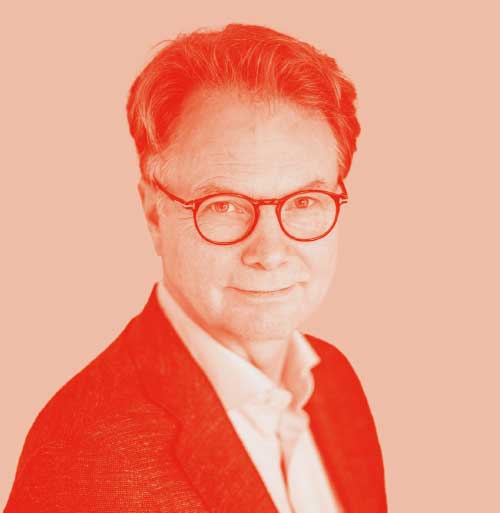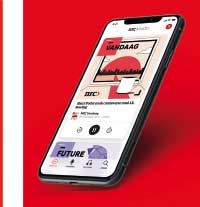René Moerland
Editor-in-chief NRC

NRC focuses on curious citizens who want to make their own informed decisions. Subscribers can choose the morning or afternoon version of the newspaper (in print or digitally) and can read articles on nrc.nl at any time of the day.
www.nrc.nl
Founded
1970
Daily readership print
401.800
Daily readership online
363.000
Number of subscribers
(print + digital) 293.170
Podcasts
NRC Vandaag, NRC Haagse Zaken, NRC Onbehaarde Apen, NRC Future Affairs & NRC Onder de Streep
Journalists employed
214
Dutch energy is bought up by Google and Microsoft. Tiktok collects data from young children, and black footballers talk about racism. Stories by NRC, for readers and listeners.

Let’s begin with a story that has nothing to do with coronavirus. In September 2020, the biggest wind farm in the Netherlands opened in the Wieringermeer polder, in North Holland. Its promise: to produce green energy for no fewer than 370,000 households.
Journalists Carola Houtekamer and Merijn Rengers had already revealed in NRC back in June that this promise wasn’t going to be kept. Alongside the turbines, Google and Microsoft data centres are also springing up and the multinationals have bought up all the green energy. Local authorities were unable to prevent it.
An important story, which led to a lot of discussion. And it isn’t an isolated story. In the coming decades, the Netherlands’ landscape is going to change dramatically. To make energy production sustainable, hundreds of windmills and vast fields of solar panels will be needed. There are already shortages ahead, but who saw that coming? Houtekamer and Rengers also discovered that data centres have been set up in the polders around the small municipality of Zeewolde that by around 2030 will consume two to three times the amount of energy that the city of Amsterdam does. Colleague Hester van Santen learned that plans to produce hydrogen in Noord-Nederland will increase energy demand by 35%.
We are proud of this sort of investigation. It brings developments to the public agenda that are under the radar. One result is that the question of national management of spatial planning is now on the political agenda.
There was plenty more agenda-setting research. Some examples: media editors Lineke Nieber and Reinier Kist exposed how, despite a ban, the popular network Tiktok was collecting data from young children without asking their parents’ permission.
A 14,000-word reconstruction by Mark Lievisse Adriaanse and Derk Stokmans about the first wave of coronavirus showed how the Netherlands overestimated its control over the virus. Very enlightening, and it helped to explain what later went wrong with Dutch corona policy.
The sports desk wasn’t deterred by cancelled competitions. Through 17 remarkable interviews with black footballers, including André Onana, Denzel Dumfries and Royston Drenthe, Bram Endedijk, Enzo van Steenbergen and Danielle Pinedo shone a spotlight on racism in football. Brain damage in sport? Evidence of the risks is systematically pushed aside in the sports world at home and abroad, Endedijk and van Steenbergen showed in research that became international news.
Our correspondent Emilie van Outeren saw for herself how repressive the regime of president Lukashenko in Belarus is. Injured by a stun grenade, she ended up in hospital, from where she stoically continued to report. Her reports focused not on herself but on the brave Belarussian women she met in hospital. At the end of the year, she sought them out.
Finally, something we are particularly proud of. On 26 September, the NRC Audio app went live, with the best podcasts from a number of media and makers. And with a growing number of exclusive NRC podcasts, such as Cocaïnekoorts (about serious crime), Hans (about the pain and dilemmas of dementia) and Future Affairs, a two-weekly exploration of our technological future with exciting thinkers. That’s how NRC is taking the lead in the promising development of audio in our (digital) newspaper company. Meanwhile, our flagship of audio journalism, the daily NRC Vandaag, has grown into the number one current affairs podcast in the Netherlands.